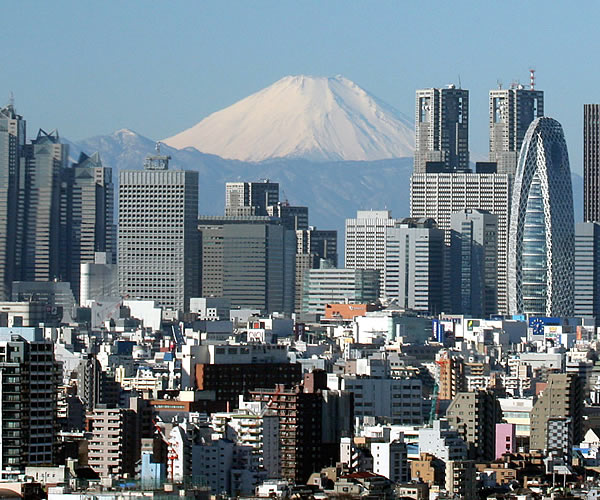
Archaeological evidence found in the region of what is now Tokyo has revealed that the area was inhabited by tribes during the Stone Age. The present city was founded in the twelfth century and bore the name
In 1941 Japan attacked the American naval base at Pearl Harbour, which brought World War Two to Japan’s doorstep. Despite important gains early in the war Japan ultimately suffered great losses and the American firebombing of Tokyo on March 10th 1945 alone killed 80,000 to 100,000 people. By the time the Japanese surrendered to Allied forces in 1945, Tokyo's population had been reduced to half of its 1940 levels, either from the death toll of bombings or because of people fleeing the capital. From September 1945 until April 1952, when the San Francisco Peace Treaty came into effect, Japan was governed and occupied by the Allies, of which the United States was the main player. Indeed the American presence in Tokyo made it an important base for command and logistics during the Korean War. Under the terms of the post-war Japanese constitution Japan is only allowed to have a small military force of its own, strictly for the purposes of defence.
After the war the emperor was relieved of his political powers and was forced to publicly admit that he was not a living god, the belief held by followers of Shinto, the national religion, up to that time. The continuing American military presence in Japan - which in Tokyo includes Yokota Air Base and a small number of minor bases - is still sizeable and is a contentious issue for many Japanese, especially since American military personnel are practically immune from prosecution by Japanese authorities should they commit any crimes while on duty in Japan.
The first Shinkansen, or Bullet Train, then the fastest train in the world, was unveiled on 1964, the same year Tokyo hosted the Olympic Games. Tokyo had finally emerged from the trauma of World War Two and the Olympics helped make Japan's "economic miracle" the centre of world attention. A boom in the Japanese economy began in 1986 and land prices in Tokyo went through the roof. By 1990 however the bubble had begun to burst and many "Salary Men" (Japanese use the English idiom), or main breadwinners, suffered the painful humiliation of losing their jobs and no longer being able to support their families during the 1990's. The World City Expo was due to be held in Tokyo in 1996 but was cancelled as a result of the actions of the Aum Shinrikyo cult in March 1995. They released poisonous Sarin gas into the Tokyo subway system, killing twelve people and affecting thousands. In 1999 the colourful, dynamic and controversial politician Shintaro Ishihara was elected Governor of Tokyo, a post he still holds.
Update 20/03/2008
Keep more of your money when transferring funds overseas!

If you want to move money abroad, from Japan or to Japan for example, Fexco provides efficient and secure global bank to bank transfers and bespoke payment solutions for both business and personal clients.
Why Fexco
Fexco provides a secure international money transfer service online or by telephone with bank beating fx rates and low fees. Specialises in high-value transfers.
Main characteristics
Fexco will help you to keep your overseas money transfer costs to a minimum.
| Margin | 0.6% |
|---|---|
| Regulator | FCA |
| Fee | £10 < £5K or Free > £5k |
| Mini | £1K |
| Ccy | All (130 currencies, incl ‘exotics’) |
| Services | Repatriation of funds, Property, Regular payments, High Value payments, spot, online, telephone. |
Get an online quote today
When you are ready to make your transfer, John and his team will be available to help you with better rates and an unrivalled service to make sure your funds are delivered securely and speedily.
